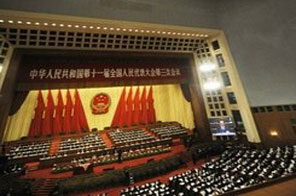China economy faces 'crucial' year: Wen
BEIJING: China's government Friday predicted another year of rapid expansion while vowing to tame inflation and curb runaway loan growth to forestall a risky bubble in the world's third-largest economy.
In an address to the annual session of parliament, Premier Wen Jiabao said China would target eight percent economic growth in 2010, which he called a "crucial year" in the battle against the global slowdown.
"This year the main targets we have set for economic and social development are increasing GDP by approximately eight percent... (and) holding the rise in consumer prices to around three percent," Wen said.
At the closely watched session of the National People's Congress, the Communist Party is expected to reassure China's 1.3 billion people that it can bridge a widening rich-poor gap and keep the economy on track.
Eight percent growth is a figure authorities feel is the minimum necessary to avert widescale joblessness and social unrest in the world's most populous country. Despite the global crisis, the economy grew 8.7 percent last year.
With the world downturn exposing the volatility of foreign trade, the session's agenda will be topped by Beijing's efforts to retool the economy away from its long reliance on cheap exports.
"This is a crucial year for continuing to deal with the global financial crisis, maintaining steady and rapid economic development and accelerating the transformation of the pattern of economic development," Wen said.
He offered a fresh pledge to boost domestic consumption as a means to diversify the economy, and vowed to maintain a "proactive fiscal policy" after 586 billion dollars of stimulus spending since 2008.
Wen said China would keep the value of the yuan "basically stable" in 2010, which is sure to rile the country's key Western trading partners, which say the currency is kept low to boost exports.
China's leaders are worried about vast wealth disparities that have emerged between regions and a floating underclass of 230 million poor migrant workers increasingly seen as a risk to national stability.
Wen acknowledged those left behind by China's boom and vowed to step up efforts to broaden the social safety net.
"We will not only make the pie of social wealth bigger by developing the economy, but also distribute it well on the basis of a rational income distribution system," he said.
China expects to run a budget deficit of 1.05 trillion yuan (154 billion dollars), up 10 percent from last year, Wen said, as it maintains the hefty stimulus plan and upgrades social security.
He also acknowledged government concern over a flood of lending that has caused inflation fears to spike, saying authorities would slash new bank loans by about a fifth in 2010 to 7.5 trillion yuan.
"We are emphasising sound development and we need to guide all sectors to focus on transforming the pattern of economic development and restructuring the economy," Wen said.
The NPC has no real legislative power but meets to rubber-stamp the decisions of the Communist Party elite in an annual ritual aimed at putting a veneer of democracy on China's rigid political system.
During the session, observers will be watching to see if a next generation of leaders led by Vice President Xi Jinping and Vice Premier Li Keqiang will take on a higher profile ahead of their expected ascent to power in 2012-13.
On the eve of the congress opening, China unveiled the smallest increase in its military budget for at least 10 years amid national belt-tightening, and vowed that its rapid military modernisation posed no threat to other countries.
As is customary during major political events in China, security has been tightened in the capital to prevent disruption.
Extra police have been deployed and a force of more than 700,000 including civilian volunteers will help keep public order, according to official media reports that dubbed the effort a "great moat" of security around Beijing.
There are up to 3,000 NPC delegates, including many from troubled minority regions like Tibet and Xinjiang.






